#Creative commons
Explore tagged Tumblr posts
Text

Clothing and fold studies.
Model: Me.
Photographer: The Remote Camera Trigger.
If you want to help support me and get awesome stuff like early access/polls & pose requests Become A Patron or you can check out my Ko-Fi store for exclusive stock!
Read My Rules Before You Use My Stock.
#Creative Commons#CreativeCommons#FreeStock Images#human anatomy#anatomyreference#FreeStock#FreeStockImage#Drawing Resource#anatomy#anatomy reference#Shirt#Clothing#Reference#Folds
40 notes
·
View notes
Text
California scrub jays



Photos by Xer S. Rowan, Creative Commons Attribution license
I'm a disabled hobby photographer taking photos for the love of photography and sharing them under a free-to-use-as-long-as-I-am-properly-credited license. For more information about me, this project, and the license I use, visit linktr.ee/DoingItForTheExposure.
#california scrub jay#aphelocoma californica#birds#bird#birblr#bird photography#photography#birdwatching#creative commons photography#creative commons#free stock images#free photos#original photography on tumblr#original photography blog
1K notes
·
View notes
Photo
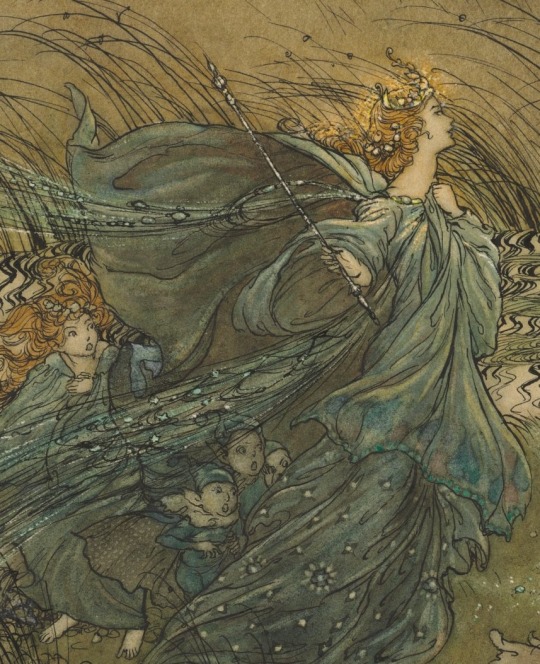
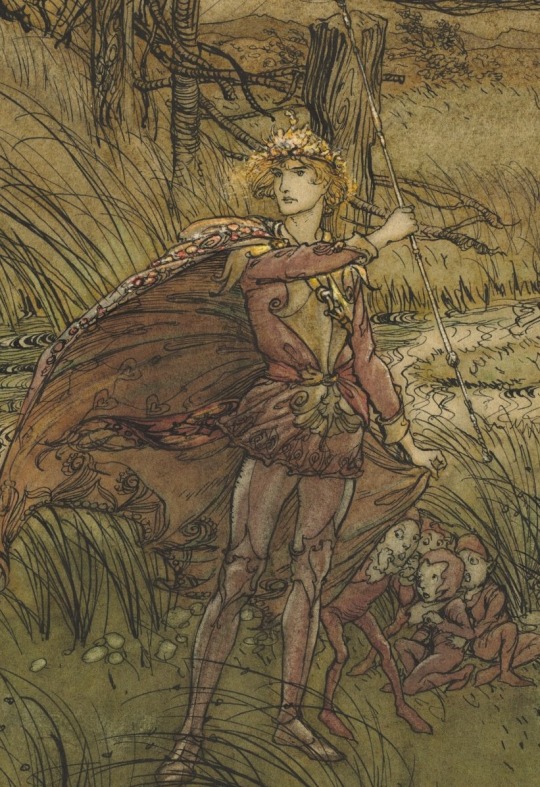
Details from Arthur Rackham’s illustration "And now they never meet in grove or green," (1908) from A Midsummer Night’s Dream by William Shakespeare
#Arthur Rackham#A Midsummer Night's Dream#William Shakespeare#Shakespeare#1900s#art detail#art details#Cleveland Museum of Art#public domain#open access#creative commons#detail#cropped#Titania#Oberon#art#illustration#vintage#vintage illustration
5K notes
·
View notes
Text
Premature Internet Activists

I'm on a 20+ city book tour for my new novel PICKS AND SHOVELS. Catch me TOMORROW (Feb 14) in BOSTON for FREE at BOSKONE , and SATURDAY (Feb 15) for a virtual event with YANIS VAROUFAKIS. More tour dates here.

"Premature antifacist" was a sarcastic term used by leftists caught up in the Red Scare to describe themselves, as they came under ideological suspicion for having traveled to Spain to fight against Franco's fascists before the US entered WWII and declared war against the business-friendly, anticommunist fascist Axis powers of Italy, Spain, and, of course, Germany:
https://www.google.com/books/edition/In_Denial/fBSbKS1FlegC?hl=en&gbpv=1&bsq=%22premature+anti-fascist%22&pg=PA277&printsec=frontcover
The joke was that opposing fascism made you an enemy of America – unless you did so after the rest of America had woken up to the existential threat of a global fascist takeover. What's more, if you were a "premature antifascist," you got no credit for fighting fascism early on. Quite the contrary: fighting fascism before the rest of the US caught up with you didn't make you prescient – it made you a pariah.
I've been thinking a lot about premature antifascism these days, as literal fascists use the internet to coordinate a global authoritarian takeover that represents an existential threat to a habitable planet and human thriving. In light of that, it's hard to argue that the internet is politically irrelevant, and that fights over the regulation, governance, and structure of the internet are somehow unserious.
And yet, it wasn't very long ago that tech policy was widely derided as a frivolous pursuit, and that tech organizing was dismissed as "slacktivism":
https://www.newyorker.com/magazine/2010/10/04/small-change-malcolm-gladwell
Elevating concerns about the internet's destiny to the level of human rights struggle was delusional, a glorified argument about the rules for forums where sad nerds argued about Star Trek. If you worried that Napster-era copyright battles would make it easy to remove online content by claiming that it infringed copyright, you were just carrying water for music pirates. If you thought that legalizing and universalizing encryption technology would safeguard human rights, you were a fool who had no idea that real human rights battles involved confronting Bull Connor in the streets, not suing the NSA in a federal courtroom.
And now here we are. Congress has failed to update consumer privacy law since 1988 (when they banned video store clerks from blabbing about your VHS rentals). Mass surveillance enables everything from ransomware, pig butchering and identity theft to state surveillance of "domestic enemies," from trans people to immigrants. What's more, the commercial and state surveillance apparatus are, in fact, as single institution: states protect corporations from privacy law so that corporations can create and maintain population-scale nonconsensual dossiers on all the intimate facts of our lives, which governments raid at will, treating them as an off-the-books surveillance dragnet:
https://pluralistic.net/2023/08/16/the-second-best-time-is-now/#the-point-of-a-system-is-what-it-does
Our speech forums have been captured by billionaires who censor anti-oligarchic political speech, and who spy on dissident users in order to aid in political repression. Bogus copyright claims are used to remove or suppress disfavorable news reports of elite rapists, thieves, war criminals and murderers:
https://pluralistic.net/2024/06/27/nuke-first/#ask-questions-never
You'd be hard pressed to find someone who'd describe the fights over tech governance in 2025 as frivolous or disconnected from "real politics"
This is where the premature antifascist stuff comes in. An emerging revisionist history of internet activism would have you believe that the first generation of tech liberation activists weren't fighting for a free, open internet – we were just shilling for tech companies. The P2P wars weren't about speech, privacy and decentralization – they were just a way to help the tech sector fight the entertainment industry. DRM fights weren't about preserving your right to repair, to privacy, and to accessibility – they were just about making it easy to upload movies to Kazaa. Fighting for universal access to encryption wasn't about defending everyday people from corporate and state surveillance – it was just a way to help terrorists and child abusers stay out of sight of cops.
Of course, now these fights are all about real things. Now we need to worry about centralization, interoperability, lock-in, surveillance, speech, and repair. But the people – like me – who've been fighting over this stuff for a quarter-century? We've gone from "unserious fools who mistook tech battles for human rights fights" to "useful idiots for tech companies" in an eyeblink.
"Premature Internet Activists," in other words.
This isn't merely ironic or frustrating – it's dangerous. Approaching tech activism without a historical foundation can lead people badly astray. For example, many modern tech critics think that Section 230 of the Communications Decency Act (which makes internet users liable for illegal speech acts, while immunizing entities that host that speech) is a "giveaway to Big Tech" and want to see it abolished.
Boy is this dangerous. CDA 230 is necessary for anyone who wants to offer a place for people to meet and discuss anything. Without CDA 230, no one could safely host a Mastodon server, or set up the long-elusive federated Bluesky servers. Hell, you couldn't even host a group-chat or message board:
https://www.techdirt.com/2020/06/23/hello-youve-been-referred-here-because-youre-wrong-about-section-230-communications-decency-act/
Getting rid of CDA 230 won't get rid of Facebook or make it clean up its act. It will just make it impossible for anyone to offer an alternative to Facebook, permanently enshrining Zuck's dominance over our digital future. That's why Mark Zuckerberg wants to kill Section 230:
https://www.nbcnews.com/tech/tech-news/zuckerberg-calls-changes-techs-section-230-protections-rcna486
Defending policies that make it easier to host speech isn't the same thing as defending tech companies' profits, though these do sometimes overlap. When tech platforms have their users' back – even for self-serving reasons – they create legal precedents and strong norms that protect everyone. Like when Apple stood up to the FBI on refusing to break its encryption:
https://en.wikipedia.org/wiki/Apple%E2%80%93FBI_encryption_dispute
If Apple had caved on that one, it would be far harder for, say, Signal to stand up to demands that it weaken its privacy guarantees. I'm no fan of Apple, and I would never mistake Tim Cook – who owes his CEOhood to his role in moving Apple production to Chinese sweatshops that are so brutal they had to install suicide nets – for a human rights defender. But I cheered on Apple in its fight against the FBI, and I will cheer them again, if they stand up to the UK government's demand to break their encryption:
https://www.bbc.com/news/articles/c20g288yldko
This doesn't make me a shill for Apple. I don't care if Apple makes or loses another dime. I care about Apple's users and their privacy. That's why I criticize Apple when they compromise their users' privacy for profit:
https://pluralistic.net/2024/01/12/youre-holding-it-wrong/#if-dishwashers-were-iphones
The same goes for fights over scraping. I hate AI companies as much as anyone, but boy is it a mistake to support calls to ban scraping in the name of fighting AI:
https://pluralistic.net/2023/09/17/how-to-think-about-scraping/
It's scraping that lets us track paid political disinformation on Facebook (Facebook isn't going to tell us about it):
https://pluralistic.net/2021/08/05/comprehensive-sex-ed/#quis-custodiet-ipsos-zuck
And it's scraping that let us rescue all the CDC and NIH data that Musk's broccoli-hair brownshirts deleted on behalf of DOGE:
https://www.cnet.com/tech/services-and-software/how-to-access-important-health-info-thats-been-scrubbed-from-the-cdc-site/
It's such a huge mistake to assume that anything corporations want is bad for the internet. There are many times when commercial interests dovetail with online human rights. That's not a defense of capitalism, it's a critique of capitalism that acknowledges that profits do sometimes coincide with the public interest, an argument that Marx and Engels devote Chapter One of The Communist Manifesto to:
https://www.nytimes.com/2022/10/31/books/review/a-spectre-haunting-china-mieville.html
In the early 1990s, Al Gore led the "National Information Infrastructure" hearings, better known as the "Information Superhighway" hearings. Gore's objective was to transfer control over the internet from the military to civilian institutions. It's true that these institutions were largely (but not exclusively) commercial entities seeking to make a buck on the internet. It's also true that much of that transfer could have been to public institutions rather than private hands.
But I've lately – and repeatedly – heard this moment described (by my fellow leftists) as the "privatization" of the internet. This is strictly true, but it's even more true to say that it was the demilitarization of the internet. In other words, corporations didn't take over functions performed by, say, the FCC – they took over from the Pentagon. Leftists have no business pining for the days when the internet was controlled by the Department of Defense.
Caring about the technological dimension of human rights 30 years ago – or hell, 40 years ago – doesn't make you a corporate stooge who wanted to launch a thousand investment bubbles. It makes you someone who understood, from the start, that digital rights are human rights, that cyberspace would inevitably evert into meatspace, and that the rules, norms and infrastructure we built for the net would someday be as consequential as any other political decision.
I'm proud to be a Premature Internet Activist. I just celebrated my 23rd year with the Electronic Frontier Foundation, and yesterday, we sued Elon Musk and DOGE:
https://www.eff.org/press/releases/eff-sues-opm-doge-and-musk-endangering-privacy-millions

If you'd like an essay-formatted version of this post to read or share, here's a link to it on pluralistic.net, my surveillance-free, ad-free, tracker-free blog:
https://pluralistic.net/2025/02/13/digital-rights/#are-human-rights

Image: Felix Winkelnkemper (modified) https://commons.wikimedia.org/wiki/File:Acoustic_Coupler.jpg
CC BY-SA 4.0 https://creativecommons.org/licenses/by-sa/4.0/deed.en
#pluralistic#eff#malcolm gladwell#section 230#copyright#copyfight#privacy#code is speech#napster#creative commons#premature antifascist#trustbusting#antitrust#al gore#nii#national information infrastructure hearings#demilitarization#information superhighway#clicktivism
514 notes
·
View notes
Text
Day 277: Lonely squid, 900 meters deep

link
–This image is part of the public domain, meaning you can do anything you want with it! (you could even sell it as a shirt, poster or whatever, no need to credit it!)–
#public domain#art#copyright#free art#open source#flickr#flickblr#photography#nature#creative commons#Northwestern Hawaiian Islands#Papahānaumokuākea#Papahanaumokuakea Marine National Monument#World Heritage Site#squid#Walvisteuthis youngorum#Hawaii#sea#deep sea#sea creatures#ocean creatures#marine biology#sea animals#aquatic#cephalopod#Northeast Gardner Pinnacles
511 notes
·
View notes
Text
A library of free-to-use Solarpunk art ☀️
A friend of mine launched this website yesterday, it's meant to promote human-made Solarpunk illustrations, so that we'll see less blurry, wobbly, weird fucking skyscrapers covered in vague green blobs attached to Solarpunk-related articles etc.
All the images available are under some version of the Creative Commons license! You can use them for zines, blog posts, papers, social media banners and so on, as long as you give credit and don't restrict others' access to them either.
If you yourself have an illustration you think would be a good fit, you can submit it here :D

You can find 7 of my own works there as well!
#please do share#it's a good resource and very easy to use#story seed library#solarpunk#solarpunk art#creative commons#free art#alt text
276 notes
·
View notes
Text

The Age of Fish!! :)
872 notes
·
View notes
Text
I drafted a legal argument against Wizards of the Coast - and you can too!
WotC is trying to pull off a licensing clawback just two years after the OGL Debacle, and I figured out how to punch back.
If you've played Dungeons & Dragons for any length of time, you've probably heard of the legendary "Deck of Many Things" – one of the game's most iconic magical items. It’s a lot of fun, and it has always been something associated with brand-name Dungeons and Dragons.
This article is about the legal usage of “Deck of Many Things,” and about how Wizards of the Coast seems to be trying to take it back in 2025 after giving it to the community in 2023. And it’s about how you can hit them where it hurts.
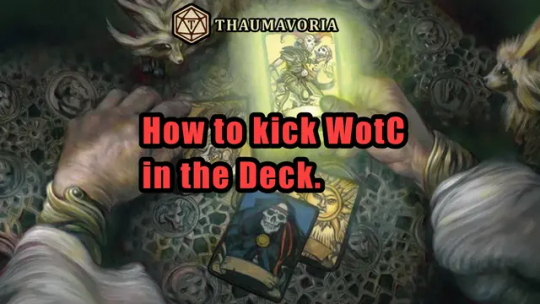
The History of the Deck
The "Deck of Many Things" has been a staple of D&D since the earliest days of the game. It's been included in every edition and is as much a part of D&D lore as dragons themselves. For years, this term was effectively the property of TSR and then Wizards of the Coast/Hasbro.
But something important happened in January 2023. After the massive backlash to their proposed OGL changes, Wizards of the Coast – through Executive Producer Kyle Brink – announced that they would be releasing the Systems Reference Document version 5.1 under a Creative Commons license:

Kyle’s announcement goes on to say: “This Creative Commons license makes the content freely available for any use. We don't control that license and cannot alter or revoke it. It's open and irrevocable in a way that doesn't require you to take our word for it. And its openness means there's no need for a VTT policy. Placing the SRD under a Creative Commons license is a one-way door. There's no going back.”
This was huge news! For those who don't know, releasing something under Creative Commons essentially means giving it to the public with very minimal restrictions. In this case, they used the Creative Commons Attribution 4.0 International License, which allows anyone to share, copy, redistribute, adapt, and build upon the material for any purpose, even commercially – as long as appropriate credit is given.
The SRD 5.1 document, which spans hundreds of pages, explicitly includes "Deck of Many Things" on page 216, along with a full description of what it is and how it works. By releasing this under CC 4.0, Wizards effectively released this term into the public domain, allowing anyone to use it in their own works.
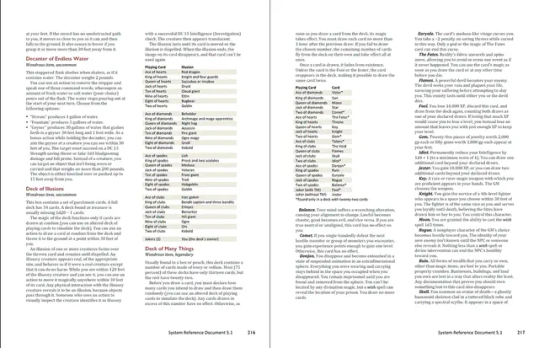
The gaming community praised this move as a step toward rebuilding trust after the OGL debacle. It seemed like Wizards had learned their lesson and was committed to supporting the community that had grown around their game.
The Betrayal
Fast forward to April 2025. WotC announced that they were revising their SRD 5.1 with a new and improved SRD versioned 5.2. For 5.2 they listed a bunch of milquetoast fantasy terms that I’m sure they’re very proud of, and kind of squeeze in a couple of footnotes. Those footnotes say that they’re going to be clawing back the term “Deck of Many Things,” as well as “Orb of Dragonkind.”


Well lo and behold, on the USPTO’s trademark search database, Deck of Many Things is in fact a pending word mark, with the latest application updated in April of 2025.
The serial number is 97260475, and you can look it up yourself on the USPTO website. This is what it looks like:
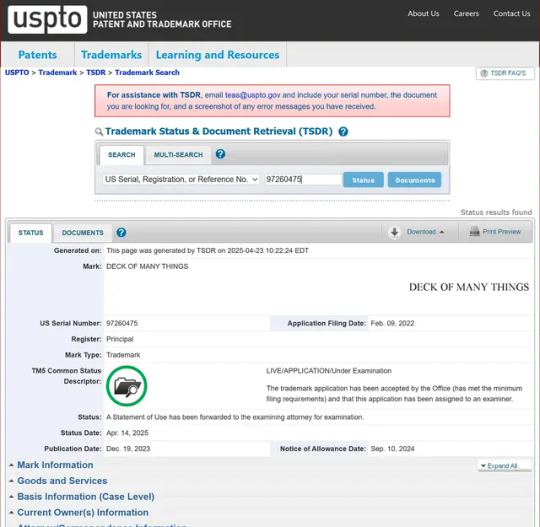
So here’s the problem. This application effectively attempts to claim exclusive rights to a term that Wizards had already released under Creative Commons just two years earlier.
Why They Can’t Do This
So why can't Wizards of the Coast trademark "Deck of Many Things" now? Let me break it down:
The Creative Commons 4.0 license they chose is explicitly IRREVOCABLE. Here's what the license actually says in Section 2(a)(1):
"The Licensor hereby grants You a worldwide, royalty-free, non-sublicensable, non-exclusive, irrevocable license to exercise the Licensed Rights in the Licensed Material."
That means once Kyle Brink proudly published the SRD 5.1 under this license on that fateful day in January of 2023, they could never take any of it back. The license explicitly prohibits imposing "additional or different terms or conditions" on the licensed material.
Attempting to register a trademark on material you've already licensed to the public represents an attempt to impose additional restrictions on that material, a violation of a term of the Creative Commons 4.0 license. Specifically it is a violation of Section 2(a)(5):
“No downstream restrictions. You may not offer or impose any additional or different terms or conditions on, or apply any Effective Technological Measures to, the Licensed Material if doing so restricts exercise of the Licensed Rights by any recipient of the Licensed Material.”
My Attempt to Challenge the Trademark
When I discovered this trademark application, thanks to Dark Kelsey, I decided to take action. The USPTO has a process called a "Letter of Protest" that allows anyone to submit evidence showing why a trademark shouldn't be granted.
I drafted a carefully formatted Letter of Protest following all the USPTO guidelines. My evidence was straightforward:
The official announcement of SRD 5.1 being published under Creative Commons
A copy of page 216 through 218 from SRD 5.1 showing "Deck of Many Things"
The full text of the Creative Commons 4.0 license highlighting its irrevocability, etc.
I TRIED to submit this through the USPTO's electronic filing system, confident that the evidence was clear and compelling.
The Setback
Unfortunately, when I tried to submit the Letter of Protest, I received this error message:
"This form cannot be submitted because it has been more than 30 days from the date the application published in the Official Gazette."
I had missed the narrow window to submit a Letter of Protest. The USPTO only allows these submissions either before publication or within 30 days after publication in their Official Gazette. By the time I discovered the application, this deadline had already passed.
This was frustrating, but it doesn't mean the fight is over.
The Path Forward
If the USPTO does grant this trademark – which they shouldn't if they're properly interpreting the prior Creative Commons licensing– there's still another option: filing a Petition for Cancellation with the Trademark Trial and Appeal Board (TTAB).
A cancellation petition allows anyone who believes they would be damaged by a trademark registration to challenge it even after it's been granted. The filing fee is $600, and the process typically takes about three years.
For this specific case, the grounds would be:
The mark doesn't function as a trademark because it was published under an irrevocable Creative Commons license
The applicant's actions in seeking the trademark contradict their prior grant of rights
The process is more involved than a Letter of Protest, but it's completely doable even without an attorney. The TTAB provides clear guidelines, and everything can be filed electronically through their online system.
Conclusion
What Hasbro and Wizards of the Coast are trying to do here is repugnant but not surprising. They're attempting to double back on a license they've already granted – something they've developed a pattern of doing every couple of years now.
First it was the OGL controversy, where they tried to revoke a 23-year-old license. The community pushed back and won. Now they're pursuing trademark terms they explicitly released under Creative Commons, trying to AMEND a creative commons license that they just published (5.2 amending 5.1), perhaps hoping no one would notice or care.
This is more than just a legal technicality – it's about trust. When a company publicly garners praise for licensing away intellectual property, only to sneakily try to reclaim it later, they're betraying the very community that supports them.
The irony here is that Wizards didn't even need to do this. They could have trademarked specific implementations or product lines featuring the Deck of Many Things without trying to claim ownership of the term itself after releasing it to the public.
So why am I telling you all this? Because you don't need to be a lawyer to challenge corporate overreach. The systems exist for regular people to participate in these processes. Whether it's a Letter of Protest or a Cancellation Petition, the tools are there for you to use.
If you care about not getting bamboozled by incompetent, dishonest corporations, consider getting involved. Watch for these kinds of trademark applications, be ready to file your own challenges, and spread the word when companies try to walk back their commitments.
Simon Says: An Addendum
After publishing this article, I received some valuable feedback here from Simon, an academic lawyer in the UK who teaches trademark law. Simon pointed out an even more straightforward legal issue with Hasbro's trademark application that deserves attention, one that transcends the Creative Commons argument.
The fundamental problem? "Deck of Many Things" likely isn't even eligible for trademark protection in the first place.
Under trademark law (both in the US under the Lanham Act and similarly in the UK), a valid trademark must be distinctive – it must have the capacity to identify goods as coming from a specific source and not another. But here's the kicker: "Deck of Many Things" products have been created by numerous publishers over the years, not just Wizards of the Coast.
This widespread use means the term has essentially become descriptive or potentially generic within the gaming industry. It no longer primarily signals "this is a WotC product" but rather "this is a type of magical card deck with random effects" – a concept that's been implemented by countless game creators.
Think about it – when you hear "Deck of Many Things," do you automatically associate it exclusively with Wizards of the Coast? Or do you think of the general concept that's been part of gaming culture for decades?
This distinctiveness requirement exists for a good reason. Trademark law isn't supposed to give companies monopolies over common terminology in an industry. It's meant to prevent consumer confusion about who made a product, not to let corporations fence off widely-used concepts.
So beyond the Creative Commons issue, there's this even more basic problem: Hasbro is trying to trademark something that likely fails the fundamental "distinctive" requirement of trademark law.
This remains an example of a corporation trying to claim exclusive ownership over community cultural elements that have been widely used and understood for decades. Whether through Creative Commons “revisions” or by ignoring basic trademark principles, the effect is the same – an attempt to monopolize what should remain in the public sphere.
#RPG#Dungeons and Dragons#gaming news#Wizards of the Coast#SRD5.2#Deck of Many Things#trademark#creative commons#legal bullshit
186 notes
·
View notes
Text

"PUMPKIN" カボチャ
* Bloodybelly comb jelly.
* Hairdresser. Mother of many Octarians, in a certain sense.
* Smells nice.
* Bathes in fish blood. It keeps her skin smooth, she says.
* Anorexic.
* Rather quiet.
* Posts Hello Catfish pastel-gore gifsets on Trawlr.
* Lives in the apartment next to Vex's.
* Vex can't stand her, but he's projecting.
CC-BY-SA 4.0, use anywhere!
#creative commons#digital art#painting#splatoon#splatoon oc#marker#jellyfish#bloodybelly comb jelly#hairdresser
215 notes
·
View notes
Text

#Ursus arctos#ursus#ursidae#carnivora#mammalia#chordata#brown bear#bear#animal#mammal#creative commons#nature#wildlife#alaska
121 notes
·
View notes
Text



FINALLY @beyondthefence sent over previews from the collab shoot with
@jademacalla @adorkastock @Blumineck1 @pirate-lotusstock and @fugitiverabbit
BRING ON THE REST as these look GREAT!
#Creative Commons#CreativeCommons#FreeStock Images#human anatomy#anatomyreference#Reference Photo#Reference Photos#anatomy#anatomy reference
747 notes
·
View notes
Text
Acorn woodpeckers, living in a utility pole.



Photos by Xer S. Rowan, Creative Commons Attribution license
I'm a disabled hobby photographer, taking and sharing photos for the love of photography. This photo may be freely used, for personal and commercial purposes, as long as the license terms are followed. For more information about me, my free photo project, and the licensing I use, visit linktr.ee/DoingItForTheExposure.
#acorn woodpecker#Melanerpes formicivorus#birblr#woodpeckers#photography#bird photography#nature photography#wildlife photography#urban wildlife#birds#original photography on tumblr#creative commons photography#creative commons#free stock images#free photos
95 notes
·
View notes
Text












The twelve signs of the zodiac, from the Horoscope of Prince Iskandar, grandson of Tamerlane, the Turkman Mongol conqueror. Apart from being a horoscope, the manuscript of 1411 is an exquisite work of art and an exemplary production of the royal kitabkhana "publishing house" or "workshop."
The manuscript is lavishly illustrated and reflects the efforts of a whole range of specialists: astronomers (among them Imad ad-Din Mahmud al- Kashi), illuminators, gilders, calligraphers and craftsmen, and specialists in paper-making.
The images and info come from the always fascinating Open: Wellcome Collection on JSTOR, which is open access with no login needed! Creative Commons: Attribution.
#zodiac#horoscope#astrology#illuminated manuscript#persian art#iranian art#open access#creative commons#research#art history#jstor
2K notes
·
View notes
Text
Introducing Opencharacters.net
I started a blog to act like sort of a database of characters. It has a search function, tags, categories and you can even follow the blog via rss feed.
I try to just give a general idea of the characters and like links to more info about things.
Opencharacters.net | RSS Feed
Check it out. I will still maintain this tumblr blog but I will also be posting there simply because I think it would prove a nicer tool for creatives.
61 notes
·
View notes
Text
Day 393: Mandelbulb Fractal (this image is so big I had to downscale it, full resolution is 48.97MB)

link
–This image is part of the public domain, meaning you can do anything you want with it! (you could even sell it as a shirt, poster or whatever, no need to credit it!)–
Zoom anywhere and you've got a new wallpaper!

#public domain#art#copyright#free art#open source#creative commons#no copyright#wikipedia pictures#wikimedia commons#wikimedia foundation#fractal#mandelbrot set#mandelbrot#fractal art#3D fractal#hi res#absurd res#abstract#wallpaper#transparent#pngs#transparent png#transparent images#math art
67 notes
·
View notes
Text

Thomas Martin Nutt. Selected Field Recordings 3, 2025
Public domain field recordings some of which are remastered from the Aporee Sound Maps. Also available from Internet Archive.
40 notes
·
View notes